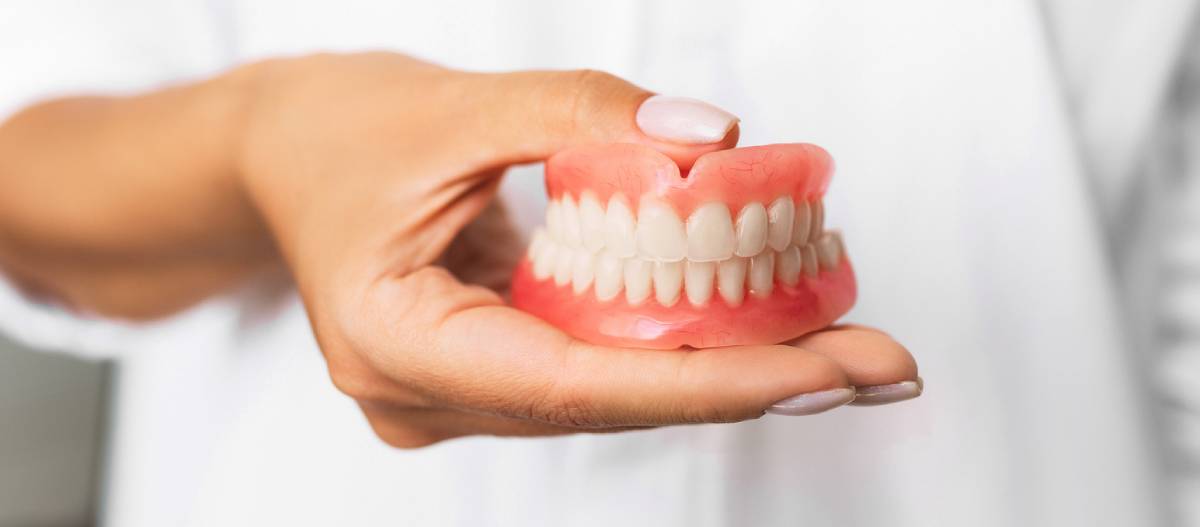Dentures are a common option in restorative dentistry. They are a set of custom-made artificial teeth that can be taken out of your mouth at any time. Modern dentures are comfortable and can look very natural. However, the fact that dentures can be taken out means that they do not feel as secure as your natural teeth. On top of that, some issues and discomfort can occur if the dentures do not fit properly. Below we will talk about how to fix poor-fitting dentures.
How Are Dentures Attached in Your Mouth?
A custom set of dentures is made for a patient in a dental lab after a dentist takes impressions of the patient’s mouth. Dentures typically consist of a flesh-colored base and artificial teeth. There are different types of dentures:
- Full dentures—replace an entire arch of missing teeth. The base part of these dentures fits over a patient’s gums. Dentures for the upper part of the mouth rely on the roof of the mouth (the pallet) for support. Dentures for the lower part are supported by the lower jawbone ridge. A special dental adhesive can be used to help the dentures securely stay in place and provide additional bite force. This type of denture should be removed, cleaned, and stored in water at night.
- Partial dentures—replace only some of the missing teeth when other teeth are intact. This type of denture also relies on the gums and bone for support, but they have clasps that hook around the remaining natural teeth. This makes partial dentures a bit more stable and secure.
- Implant-retained dentures are also removable like traditional dentures. However, they stay in place by snapping on the implanted metal posts. Typically, they provide more stability than traditional dentures.
- Implant-supported dentures are non-removable. They are probably the most stable of all, but the cleaning routine can be a bit harder than with other types.
In this article, we will discuss the issues of poor-fitting removable dentures.
Signs That Your Dentures Do Not Fit Properly
Typically, if your dentures are fitted well to begin with, you should not experience any issues or discomfort. However, if you have any of the symptoms listed below, it most likely means that your dentures do not fit your gums properly:
- Your dentures shift, wobble, slip, or produce a clicking noise when you eat or talk
- Difficulty chewing and speaking
- Gum irritation, sores, or bleeding
- Bite misalignment
- Headaches and earaches
- Bad breath or taste in the mouth (can be caused by oral infection)
If your dentures do not fit properly, it can lead to many health-related issues, including malnutrition, because you can not properly chew a wide range of food.
Why Can Dentures Feel Uncomfortable?
There are several reasons why your dentures can feel uncomfortable:
- Following tooth loss, your jaw bone can start shrinking, which, over time, leads to a change in the way your dentures fit your mouth.
- Your dentures are damaged in some way.
- Dentures are wrong in size and do not fit your bite or shape of your jaw properly to begin with
- Your dentures are new, and you just need some time to get used to them (it usually takes a month or two to get used to wearing dentures, as they do not feel or function exactly like natural teeth)
How to Fix Poor-Fitting Dentures?
To avoid further complications, visit your dentist as soon as you start noticing the signs that your dentures might not fit your gums properly. There are several options for fixing poor-fitting dentures:
Getting your dentures readjusted with the use of special lining material (acrylic, silicone, etc.)
Getting your dentures filed down to fit better
In some cases, just using special denture adhesive might solve the issue and keep the dentures in place (your dentist can recommend the best product for your case)
Sometimes, you will need to completely replace the set of dentures for a properly fitting one, significantly if the size and shape of your bones change over time.
There is also an option of switching to dental implants or implant-supported dentures if wearing traditional dentures is uncomfortable for you, even after adjustments. Dental implants can sometimes be impossible due to some health issues. It is also a much pricier solution than traditional dentures. However, if your health and budget allow you to get implants, the comfort and security of them can be worth it.Make an Appointment Today
If you have trouble adjusting to wearing dentures or need a new set, make an appointment at our office today. Our dental specialists will help you to feel comfortable and secure with your dentures. Restorative dentistry is one of our specialties in East Highland Dental. We are looking forward to welcoming you to our office.

